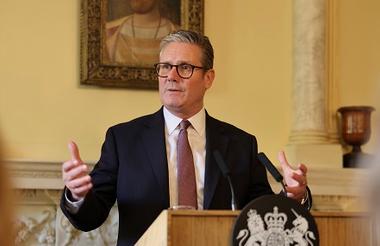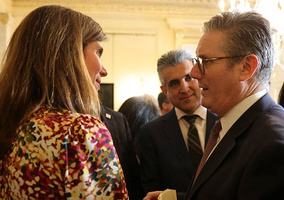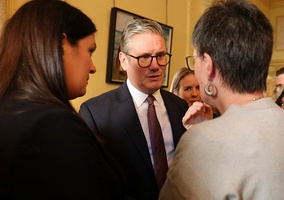Formally announcing the Civil Society Covenant a few months after taking office last year, prime minister Keir Starmer said the document would signify a “fundamental reset” of the government’s working relationship with the sector.
Many charities feel such a reset is needed to mend a “significant breakdown in trust” between them and the state, according to a recent report from umbrella bodies NCVO and ACEVO.
Now, with the final principles set to be published this summer, seven sector leaders tell Civil Society what they most hope the covenant will include.
Katie Ghose, chief executive of Kids
Food banks, homeless shelters, holiday programmes for disabled children – civil society organisations are masters of providing practical support today and scalable policy solutions for tomorrow. Leaders understand the root cause and effect of poverty, abuse, addiction and other cross-cutting ills and translate their frontline insights into credible, long-term blueprints for reform, often backed by data uniquely drawn from their services.
My biggest hope for the covenant is that it recognises the vast and largely untapped resource sitting within civil society organisations, large and small and uses it to address society’s knottiest issues: hungry children; lonely older people; young people losing hope for a safe and secure future.
How should the covenant achieve this? Firstly, by mandating early and honest engagement, including government bodies seeking civil society advice on who to engage with and how. Secondly, by getting the basics right; no more inaccessible government consultations with accessible versions as the afterthought. Thirdly, it should use organisations’ convening power; sometimes it’s easier for civil society to bring officials from across Whitehall together with other groups to look afresh at a knotty problem. Finally, commissioning frameworks should be reformed, opening the doors for civil society organisations, councils and local health bodies to collaborate in the design and delivery of local services.
In a nutshell, make civil society part of the missions. Social sector organisations take the can-do spirit to another level; at a time when constrained finances overshadow every decision, the covenant is a golden opportunity to transform the relationship between civil society and state, and to benefit us all.
Tom Lawson, chief executive of Turn2us
To rebuild trust, we need more than warm words. We need genuine dialogue and concrete action.
From the pandemic to soaring inflation, the last five years have seen more economic shocks than we’d expect in a generation. Each one has had a devastating financial impact, and the people with the least have paid the highest price.
Turn2us works with people impacted by these crises every day. People who know what needs to change, but who are too often shut out of the decisions that affect them most. Organisations like ours help make sure their voices are heard by those in power and play a part in shaping solutions.
We’ve had encouraging early conversations with government. But positive signals have been undermined by cuts to disability benefits and inaction on the two-child limit.
The evidence is clear: ending hunger and hardship could strengthen our economy by £75bn a year, according to analysis from Trussell and WPI Economics. But across the sector, there is frustration that the Treasury continues to underestimate these social and economic gains and remains the hardest department to engage with.
When hundreds of civil society organisations warn that communities and services cannot withstand further cuts, the government – and particularly the Treasury – needs to show it is listening.
If this covenant is to mean anything, it must mark a reset. One where civil society, and the people we stand alongside, are heard and respected. That we are part of shaping policy, not sidelined by it.
Shabna Begum, chief executive of Runnymede Trust
There has been a long period where progressive racial justice actors like the Runnymede Trust were not only cast out to the political wilderness, but were actively attacked by the government through aggressive “culture wars” narratives. That experience represented the very worst degradation of relationships between government and civil society voices. Not only was the value of expertise excluded but pluralism and the need for check and balance on government power were defined as enemies of the system, rather than necessary features of our democracy.
So it was with some relief that we welcomed the new Labour government’s promise of a reset of the relationship through the development of the Civil Society Covenant. Our experience thus far has been mixed, we have seen an initial defrosting of relationships, but we have also witnessed conversations tailing off when the content becomes difficult or when what we have said is challenging and uncomfortable.
With the multiple political, economic and climate crises we currently confront, and the rise of far-right politics globally and domestically, it cannot be that organisations like the Runnymede Trust – one of the most authoritative and credible racial justice think tanks, is only afforded space when what we say what is convenient and palatable – in fact, we add the most value when we are allowed to be the critical friend.
I hope the new covenant can engender a revitalised political culture, one where we can move beyond the “first date” scenario and smiling photo opportunities, to one where we can build trusting, meaningful relationships that can handle – and indeed welcome – stressful conversations and thereby deliver better governance and policy through them. The very future of our democracy relies on this being the case.
Tom Brake, director of campaign group Unlock Democracy and former government minister
The covenant is a perfect opportunity to reset the relationship between government and civil society groups. This has been rocky for a number of years and worsened after the uncertainty caused by the introduction of the Lobbying Act and more recent attacks on the sector’s right to advocate for change.
The covenant must set out clear principles for how the relationship will work, but also concrete measures that will determine how civil society can engage with government and input into policy processes.
The relationship must be constructive, collaborative but also combative when necessary. Civil society is keen to contribute to government programmes, but must not be seen just as a tool to deliver the government’s Plan for Change. It also needs the freedom to speak out and act as a critical friend.
Beccy Speight, chief executive of RSPB
At the RSPB, we manage over 200 incredible nature reserves and restore nature at scale, bringing species in the UK, the UK Overseas Territories and around the world back from the brink of extinction. In doing this we also help store carbon in our landscapes, improve the health and wellbeing of people, protect communities from flooding and the impacts of climate change and much more.
The government has legally binding targets to restore nature and is committed to net zero. In this, we’re a partner in a shared endeavour.
Indeed, we have long worked with governments of many colours on our mutual challenges. By working together, we can deliver for people, nature and the climate at scale – all while meeting our international commitments to restore our natural world. We bring different strengths and together we are greater than the sum of our parts.
But that shared endeavour must be built on trust. Trust enables us to plan for the long term, to manage our finances effectively, to collaborate, to work together on the science and solutions to nature’s greatest problems. And like all great relationships, trust enables us to challenge each other, yet emerge stronger as a result.
This is all crucial to deliver at the scale and pace needed now to restore our natural world before it’s too late. A healthy natural world is not just intrinsically valuable. It underpins our society. It’s fundamental to the economy, to farming, to adapting to climate change, to our health and wellbeing, to our energy needs, even international affairs. Because of this, trust between government and our sector is needed at all levels of government and across all departments.
My hope – for nature’s sake, for all of us – is that trust is placed at the heart of this covenant and it’s taken seriously right around the cabinet table and at all levels of government.
Paul Parker, recording clerk for Quakers in Britain
Quakers seek a peaceful, just and equitable society. For us, a healthy and transparent democracy is the path to that. Yet at the moment the international CIVICUS monitor rates UK civic space as “obstructed” because of limitations on civil society campaigning and the right to protest.
As I wrote here a few weeks ago, we need more of a turning point than a reset, but the Civil Society Covenant has the potential to be a step in the right direction. For that to be the case, it needs to be part of a wide-ranging culture change across Whitehall; one which puts civil society voices at the heart of policy-making. Charities and other movements can provide data insights, the perspective of beneficiaries and long experience of serving those whom society fails. To do so they need to be routinely at the table, and able to speak freely from that experience, without losing funding or facing ministerial or regulatory criticism for doing so.
So far the rhetoric has been positive, but to convince me the covenant will need to be more than words. It will need to show real intent to change government attitudes to civil society and especially to dissenting voices. It will need training out to reinstate atrophied partnership-working muscles in the civil service after 15 years of neglect. It will need a reporting framework so we can see if change is really happening and call it out if it isn’t – if it’s not measured, it won’t happen. And it will need ministers and departments which don’t get on board with it to be dealt with robustly, such as by including a commitment to it in the ministerial code.
High expectations maybe, but then a healthy and vibrant democracy is a high ideal. Let’s try it.
Kathy Evans, director of policy and influencing at NYAS
For a charity like the National Youth Advocacy Service (NYAS) the relationship between our mission and any government of the day in any nation of the UK, local or national, is not waiting for a covenant to describe it.
Our relationship with the state is already written into statute – written into the Children Act 1989 as a right that each child has to an independent advocate whenever the state is making decisions about them in the care system. Written into family law and court practice as the specialist child-centred lawyers that must be available to represent a child the judge believes needs their own voice and perspective represented in court as their parents battle over them.
We may sign contracts with the state but we aren’t delivering services for the state, we have to do what we do for the child – even (and perhaps especially) when we need to challenge the state on their behalf. That means speaking their truth to state power in everyday meetings, it means making complaints on their behalf, telling uncomfortable truths about their realities. That’s us doing our job so that the state does theirs. It’s written in the contract, in the job description, in statute and guidance.
Our independent, outspoken purpose is written in every article of the Human Rights Act and UN Convention on the Rights of the Child. And we hope for a convenant that grasps just how deep our interdependence goes.
Related articles












